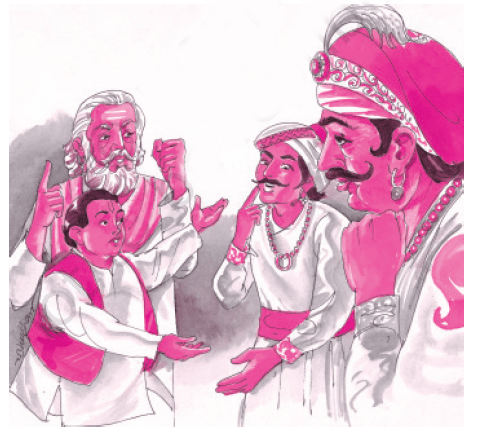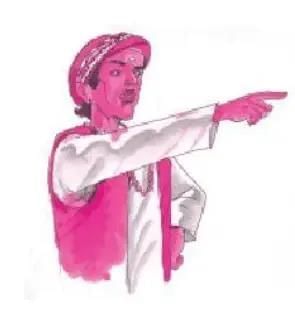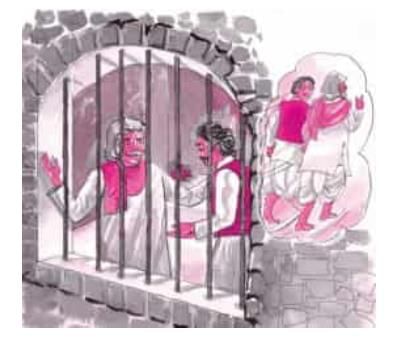Class 9 Exam > Class 9 Notes > English Class 9 > Character Sketch - In the Kingdom of Fools
Character Sketch - In the Kingdom of Fools | English Class 9 PDF Download
| Table of contents |

|
| The Guru |

|
| The Disciple |

|
| The King |

|
| The Minister |

|
The Guru
The guru was a very wise man who never succumbed to any temptation. He was quick to judge that his disciple and he were in the Kingdom of Fools. Knowing that the behaviour of foolish people is unpredictable, he decided to leave the city immediately. He was not tempted like his disciple was by the one duddu price for everything in that kingdom. He also knew that a foolish person should be tackled wisely. He did not try to reason with the king regarding the innocence of his disciple. Instead, he flattered the king with false praise and secured the freedom of both his disciple and himself. He earns readers’ appreciation for his intelligence and presence of mind.
He also knew that a foolish person should be tackled wisely. He did not try to reason with the king regarding the innocence of his disciple. Instead, he flattered the king with false praise and secured the freedom of both his disciple and himself. He earns readers’ appreciation for his intelligence and presence of mind.Question for Character Sketch - In the Kingdom of FoolsTry yourself:What quality of the guru is highlighted in the passage?
View Solution
The Disciple
The disciple was a simple but greedy fellow. He followed his guru everywhere and listened to him. However, he could not resist the temptation of good and cheap food available in the Kingdom of Fools. He ignored his guru’s warning and chose to stay back. His greed almost cost him his life, but he quickly came to his senses. He had faith in his guru’s powers; that is why he first recalled him in his thoughts and then behaved according to the plan devised by him. This character also brings a smile to the reader by how he grows fat after eating bananas, rice, wheat and ghee.
He ignored his guru’s warning and chose to stay back. His greed almost cost him his life, but he quickly came to his senses. He had faith in his guru’s powers; that is why he first recalled him in his thoughts and then behaved according to the plan devised by him. This character also brings a smile to the reader by how he grows fat after eating bananas, rice, wheat and ghee.Question for Character Sketch - In the Kingdom of FoolsTry yourself: What led to the disciple almost losing his life?View Solution
The King
The king was a fool who owned a beautiful kingdom. He could go to any length in order to be different from others. His orders were foolish, and his ideas were stupid. Turning day into night and ordering the execution of those who disobeyed are examples of his silliness. The king had no idea about justice. Assuring the thief’s brother that justice would be done and terming the thief’s death as murder indicates his lack of knowledge about justice. The king did not have a sound sense of judgment about people either. He could not see that the guru was flattering him to rescue his disciple. His gullible disposition led him to believe every word uttered by the guru, and he was eventually executed by his own men.
Assuring the thief’s brother that justice would be done and terming the thief’s death as murder indicates his lack of knowledge about justice. The king did not have a sound sense of judgment about people either. He could not see that the guru was flattering him to rescue his disciple. His gullible disposition led him to believe every word uttered by the guru, and he was eventually executed by his own men.The Minister
The King’s foolishness was rivalled only by his minister, who was an equal partner in the foolish orders passed by the king. The king consulted him on different matters, but the minister never gave any sound advice. He would be as irrational as the king himself. It was the minister’s idea to find a fat man who fitted the stake so that the order of execution could be put through. The killing of the minister does not rouse any sympathy, for he was a foolish character who was responsible for his own death.
The document Character Sketch - In the Kingdom of Fools | English Class 9 is a part of the Class 9 Course English Class 9.
All you need of Class 9 at this link: Class 9
|
180 videos|976 docs|124 tests
|
FAQs on Character Sketch - In the Kingdom of Fools - English Class 9
| 1. What is the central theme of "The Kingdom of Fools"? |  |
Ans.The central theme of "The Kingdom of Fools" is the absurdity of foolishness and the consequences of irrational decisions. The story illustrates how a kingdom ruled by foolishness leads to chaos, emphasizing the importance of wisdom and critical thinking in governance and daily life.
| 2. Who are the main characters in "The Kingdom of Fools"? |  |
Ans.The main characters in "The Kingdom of Fools" include a foolish king and his equally foolish ministers, as well as a clever protagonist named the merchant and his friend, who challenge the absurdities of the kingdom. Their interactions highlight the contrast between wisdom and folly.
| 3. How does the setting of the story contribute to its message? |  |
Ans.The setting of the story, a kingdom where everything is turned upside down due to the foolishness of its rulers, serves as a backdrop that emphasizes the theme of absurdity. This bizarre environment allows the author to critique the irrationality of certain societal norms and decisions.
| 4. What lessons can be learned from the events in "The Kingdom of Fools"? |  |
Ans.Readers can learn that blind adherence to foolish customs can lead to negative consequences. The story teaches the importance of questioning authority and thinking critically, as well as the value of intelligence and wit in overcoming challenges.
| 5. How does the clever protagonist outsmart the foolish king in the story? |  |
Ans.The clever protagonist outsmarts the foolish king by using wit and strategy to expose the absurdity of the king's decisions. He cleverly navigates the ridiculous laws and customs of the kingdom, ultimately demonstrating that intelligence can triumph over foolishness.
Related Searches
















